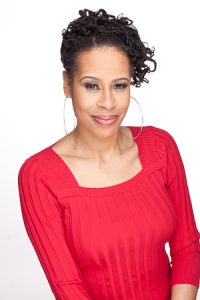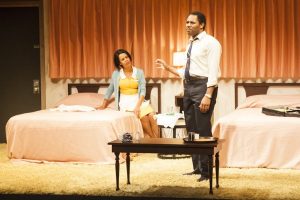
 Actor and playwright Dominique Morisseau is one of our generation's most prolific artists, committed to creating revolutionary work that breaks down boundaries and challenges old views not authentic to the actual black experience. It was an absolute pleasure to chat with the history-making playwright of "Sunset Baby", now extended through December 15th at Labyrinth Theater Company. (Read our review here.)
Actor and playwright Dominique Morisseau is one of our generation's most prolific artists, committed to creating revolutionary work that breaks down boundaries and challenges old views not authentic to the actual black experience. It was an absolute pleasure to chat with the history-making playwright of "Sunset Baby", now extended through December 15th at Labyrinth Theater Company. (Read our review here.)
Read the interview below to learn about Morisseau's inspiration for "Sunset Baby", Tupac Shakur, and how she's a part of a revolution.
StageBuddy: How long did you sit with "Sunset Baby", and what was your inspiration behind it?
Dominique Morisseau: Not very long to be very honest with you. It's one of those plays that I started writing when the idea initially came to me in maybe a two day lifespan when I went, "Hey, I think I want to write this play about this father and daughter and something about some letters, and he's coming back for the mother's letters." And I started writing it, and I went on pause, and I didn't pick it back up for another half a year; and when I picked it back up, I was in the Lark Play Development Center in the Playwrights Workshop and picked it back up then.
A lot of different things inspired the play for me. I'm interested in the Black Liberation Movement. I grew up reading about the Panthers and I grew up doing my own research in high school about the black liberation movement; I read Assata Shakur's autobiography. I was reading a lot about Tupac Shakur. Kevin Powell, who's a journalist and a friend of mine, had done a lot of interviewing with Tupac, and I remember him writing about this one moment with Tupac's relationship with his father: after Tupac passed Kevin was talking to Tupac's father and he asked him if he should be getting a lawyer or something to deal with Tupac's estate, should he be trying to get access to his son's legacy; and I remember Kevin's reaction in writing of heartbreak because Tupac's father hadn't been there in his life but he was seeking access to his legacy in his death.
I started thinking about what that relationship is because that hurt me a lot, too, but it also made me hurt for the father. I thought a lot about Tupac because my husband (J.Keys) is a hip hop artist and fan of Tupac's music, so I listened to it with different ears when I got into a relationship with him. And I've always been intrigued by Pac because he was such an amazing MC and such a charismatic person -- there's never been anyone else like him -- and I thought how he's so prolific and so self-destructive. And how do people have those same two things in the same body? how can you be so progressive and prolific, profound, and also be self-destructive? I wanted to explore that, so Nina is very much inspired by Tupac.
Last thing I will say is my father -- who's always been a part of my life and has been married to my mother since I was born -- my father when I was a kid used to raise me on certain revolutionary principles, and my father when I was a little girl took a picture of me in the sunset. I've always kept that picture and I saved it under my computer under the title 'Sunset Baby'. That picture to me shows how a father feels about his child without words -- and that became a jumping off point.
 SB: In a revolution, what part would you play?
SB: In a revolution, what part would you play?
DM: I'm in a revolution. I think right now it's about how you define 'revolution.' In theater, I'm a part of a revolution of black artists being heard and taking back their identity and defining themselves away from being whitewashed. I'm a part of the movement of defining myself as a black artist who's proud of being that and who is unafraid to write about uncomfortable things and unafraid to show black people in work without apologizing for it.
I also feel in the bigger world I'm a global citizen, and I'm very much concerned about what's happening to us globally in our world. And however I can play a part in bringing our story to a national conversation ,and however I can play a part to alleviate the different struggles of people around the world, I'm willing to do.
SB: Why is this the right time for "Sunset Baby"?
DM: One is we're making history here at Labyrinth. So anytime you make history it's a good time. I'm the first black woman playwright to be produced by this company, and Kamilah Forbes is the first black woman director, so together we're a team of firsts.
The story is relevant right now, and I think it will be relevant 20 to 30 years from now -- because it's timeless, about father/daughter, and parenting and relationships between man and woman, and what our roles are to our offspring and to the next generation, and that will always be something we'll always be thinking about socially. The boldness and edge of this play, in particular, there's been a hunger for because there has been a lack of it in theater lately, and especially among works of color and this feels like the right time to break out with a new voice and a new perspective on some very old stuff.
 SB: How do you find the balance between being an actor and writer?
SB: How do you find the balance between being an actor and writer?
DM: I'm still learning how to do it -- this has been the busiest year for me as a playwright and an actor. My acting career has been slow because I've been focused on my writing, and this year I was able to do a show while I had two shows in rehearsal for production at the same time. Right now my show "Detroit 67" is running in Chicago, and while that play and "Sunset Baby" were in rehearsals, I was finishing up performances for "The Mountain Top" at Actors Theater of Louisville. I've had to turn down some acting offers that have come in the past weeks because I'll be working on my play next year and I'll be in production -- and it's feast or famine sometimes, but I'm working on it.
SB: Advice to the aspiring artist?
DM: My advice is to find a mentor -- and a mentor can be someone your same age or someone older than you, but they are really someone who has more experience than you at what you want to do; that is crucial. We have to have mentors; we have to have people we can talk with to give us some guidance when things get crazy. Mentors are also your advocates and that's urgent to me. You really have to figure out what you're willing to fight for because this is a fight, this isn't an easy journey, and if we are willing to accept everything that comes our way because we're so thirsty to work, we're going to get everything that comes our way, and we got to be ready for that. But you have to be clear about what you want to do and your vision as an artist; and I challenge you and advise you to stick to that and look for that kind of work -- because it exists, and if it doesn't exist then you're going to have to create it.
(This interview has been edited and condensed.)
Thank you to Erin Cherry (With A Cherry on Top Productions) for helping to put this interview together.
Performances of "Sunset Baby" continue through December 15th. Read our review here, and our interview with director Kamilah Forbes here.